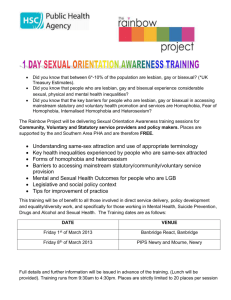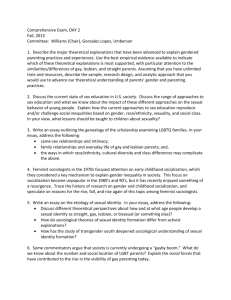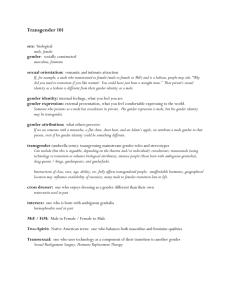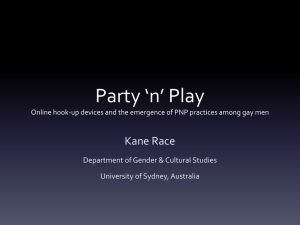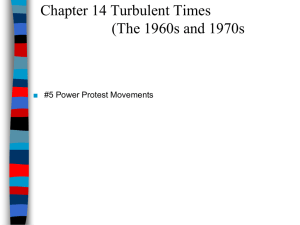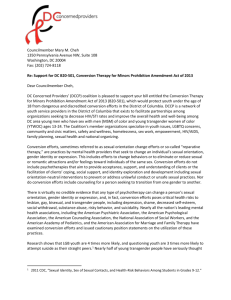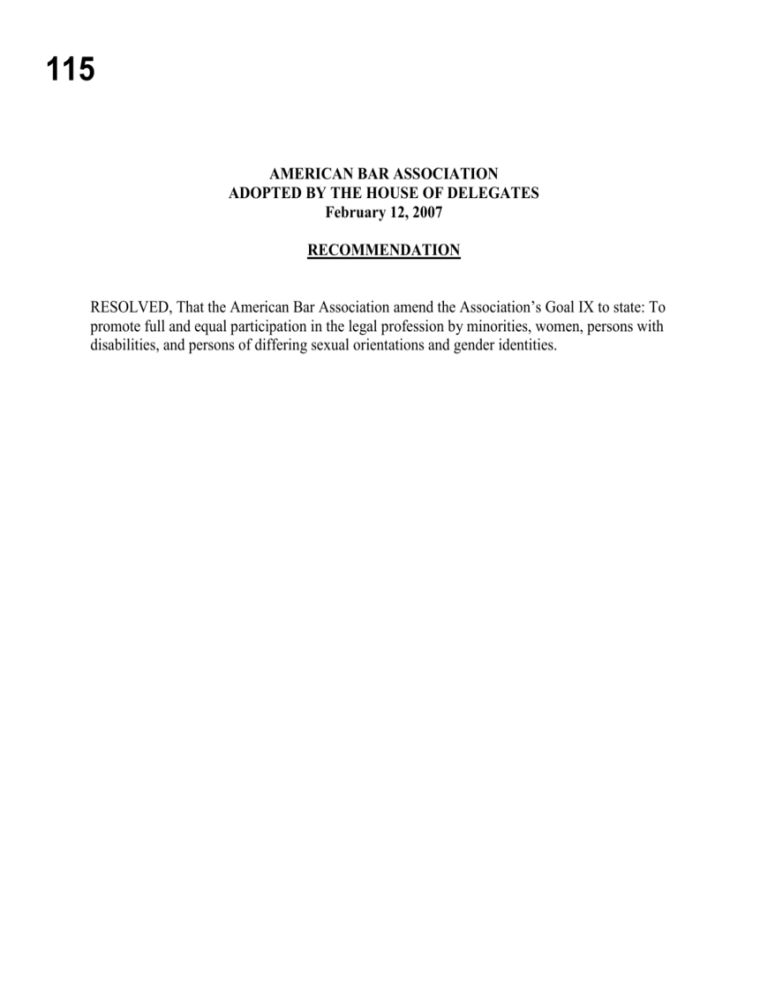
115
AMERICAN BAR ASSOCIATION
ADOPTED BY THE HOUSE OF DELEGATES
February 12, 2007
RECOMMENDATION
RESOLVED, That the American Bar Association amend the Association’s Goal IX to state: To
promote full and equal participation in the legal profession by minorities, women, persons with
disabilities, and persons of differing sexual orientations and gender identities.
115
REPORT
Purpose of this Recommendation
The eleven Goals of the American Bar Association reflect the specific ideals that the ABA
aspires to serve in all its work. When originally adopted in 1991, Goal IX was “to promote full
and equal participation in the legal profession by minorities and women.” In 1999, the
Association, reflecting the desirability of ensuring professional opportunities for the disabled,
amended Goal IX to include “persons with disabilities.” In furtherance of Goal IX, the
Association has taken a host of actions that have greatly increased opportunities for minorities,
women and persons with disabilities to achieve their full potential as members of the bar.
Over the last twenty years, the House of Delegates has also adopted numerous policies opposing
discrimination on the basis of sexual orientation in many settings, including law schools, the
judicial system and the profession. The House recently extended its non-discrimination
commitment to oppose bias based on gender identity.1 Consistent with those policies, and to
further the goal of diversity, the Board of Governors adopted a Strategic Plan in August 2006
that includes, in its diversity strategy, a pledge to increase the number of lawyers of all diverse
groups so that the ABA is truly representative of American society.
The proposed recommendation will amend Goal IX to incorporate in its express terms the
diversity commitment reflected in existing ABA policies and philosophy. The proposed
amendment will serve the chief purposes of Goal IX: to ensure that all persons, including those
who are members of groups that historically have been discriminated against, are provided with
full and equal opportunities within the legal profession; and to affirm that diversity in the legal
profession is beneficial for all lawyers, just as it is for the community at large.
Current ABA Policy on Sexual Orientation and Gender Identity
The Association has a long and proud tradition of actively opposing discrimination on the basis
of sexual orientation, and the Association recently extended that opposition to discrimination on
the basis gender identity. For example, the Association has adopted policies calling upon local,
state, and federal lawmakers to prohibit such discrimination in employment, housing, public
accommodations, credit, education, and public funding.2 The ABA also has opposed
1
As used herein, the term "sexual orientation" means homosexuality, bisexuality, or
heterosexuality, whether the orientation is real or perceived; and “gender identity” refers to a
person’s self-identification as a man or a woman, even if that identification does not correspond
with the person's biological sex. These definitions are consistent with similar uses of these terms
in prior ABA reports and recommendations.
2
See, e.g., resolutions adopted 8/89 (urging prohibition of sexual orientation discrimination in
employment, housing and public accommodation); 8/06 (urging prohibition of discrimination on
the basis of actual or perceived gender identity or expression, in employment, housing and public
accommodations).
1
115
discrimination on the basis of sexual orientation in many areas of family law.3 Pursuant to this
commitment and these various policies, the ABA actively has participated in lobbying for
effective federal anti-discrimination legislation and has filed numerous Supreme Court amicus
briefs urging the adoption of strong anti-discrimination positions with respect to sexual
orientation.4
The Association has taken steps to help eliminate barriers against the equal participation by gay
and lesbian persons in the profession. For example, the ABA’s law school accreditation
standards have been amended to require that law schools provide equal educational and
employment opportunities without regard to, among other things, sexual orientation.5 Within the
larger profession, the ABA has urged the study and elimination of judicial bias on the basis of
sexual orientation, among other bases.6
Why This Recommendation Is Necessary
Through previous recommendations, the ABA has recognized that lesbian, gay, bisexual, and
transgender people face pervasive discrimination in all aspects of life, including within the legal
profession. As discussed in more detail below, studies sponsored by numerous state and local bar
associations around the country have consistently demonstrated that, while progress is being
made, discrimination against lesbian, gay, bisexual, and transgender people within the profession
persists. It is particularly important for the Association to take affirmative steps to promote full
and equal participation for such persons within the profession, not only to further the ABA’s
diversity commitment, but also because such persons still receive little statutory protection from
discriminatory employment practices. As of November 2006, only 16 states and the District of
Columbia explicitly prohibit employment discrimination on the basis of sexual orientation7 and
See, e.g., resolutions adopted 8/95 (regarding a parent’s sexual orientation and child custody or
visitation determinations); 2/99 (regarding sexual orientation and adoption); 8/03 (regarding
second-parent adoptions by same-sex and other unmarried couples); 2/06 (regarding a parent’s
sexual orientation in adoption and foster care determinations).
4
For example, in 2003, the ABA filed an amicus brief in Lawrence v. Texas, urging the Court to
overturn its 1986 decision in Bowers v. Hardwick. Lawrence v. Texas, 539 U.S. 558 (2003)
(striking down Texas statute that prohibited consensual sexual conduct between two persons of
the same sex); ABA Amicus Brief, 2003 WL 164108. In 1996, the ABA also filed an amicus
brief in Romer v. Evans, in which the United States Supreme Court struck down an amendment
to the Colorado Constitution that prohibited the state and local jurisdictions from enacting
provisions which prohibited discrimination on the basis of sexual orientation. Romer v. Evans,
517 U.S. 620 (1996); ABA Amicus Brief, 1995 WL 17008433.
5
Resolution adopted 8/94 (requiring equal educational and employment opportunities regardless
of, among others, sexual orientation).
6
Resolution adopted 9/91 (urging study and elimination of judicial bias based on, among others,
sexual orientation).
7
The 17 jurisdictions (including D.C.) are: California, Connecticut, D.C., Hawaii, Illinois,
Maine, Maryland, Massachusetts, Minnesota, Nevada, New Hampshire, New Jersey, New
Mexico, New York, Rhode Island, Vermont, and Washington. Cal. Gov. Code § 12940; Conn.
Gen. Stat. § 46a-81c-m; D.C. Code §§ 2-1401.01 - 2-1401.02, 2-1402.11, 2-1402.21, 2-1402.31,
3
2
115
only 6 statutes explicitly prohibit employment discrimination on the basis of gender identity. 8
There is no federal statute prohibiting employment discrimination on the basis of either sexual
orientation or gender identity.
As numerous bar studies confirm, prejudice and harassment on the basis of sexual orientation
gender identity is common. 9 Such behavior thwarts the diversity goals of the Association by
impeding the participation in the profession of persons who are its targets. In addition,
professional advancement for gay and lesbian lawyers is unquestionably impeded by the barriers
of discrimination.10 Thirty percent of judges and attorneys surveyed by a Task Force of the
Arizona State Bar11 reported that they believe that lesbian and gay attorneys are disadvantaged in
the profession because of their sexual orientation.12 A 1993 study by the Association of the Bar
of New York City found that 54% of the participants believed that their sexual orientation
negatively affected their ability to succeed in the legal profession.13 Respondents, for example,
reported the following:
2-1402.41, 2-1402-71, 2-1402-73; Haw. Rev. Stat. §§ 515-2 – 7, Haw. Rev. Stat. §§ 378-1 – 3,
Haw. Rev. Stat. § 489.2 – 3; 775 ILCS 5/1-102; Me. Rev. Stat. Ann. Tit. 5, §§ 4553 & 4571-76;
Md. Code art. 49B § 5; Mass. Gen. Laws Ann. Ch. 151B, §§ 3 & 4; Minn. Stat. §§ 363A.01 –
363A.41; Nv. Rev. Stat. § 613.330; N.H. Rev. Stat. Ann. §§ 21-I:42, 354-A:2, 354-A:6; N.J.
Stat. Ann. §§ 10:5-1 – 49; N.M. Stat. Ann. §§ 28-1-2, 28-1-7, 28-1-9; N.Y. Exec. Law §§ 296,
296-a; R.I. Gen. Laws §§ 28-5-3, 28-5-7, 34-37-4, 34-37-4.3, 11-24-2; 21 Vt. Stat. Ann. § 495, 9
Vt. Stat. Ann. § 4503; 8 Vt. Stat. Ann. §§ 10403 & 4724; 3 Vt. Stat. Ann. § 963; Wash. Rev.
Code §§ 49.60.130-175, 176, 178, 180, 190, 200, 215, 222-225, 300.
8
The states are: California, Illinois, Maine, Minnesota, New Mexico, and Rhode Island. Cal.
Govt. Code §§ 12926 & 12940; 775 ILCS 5/1-102; Me. Rev. Stat. Ann., tit. 5, §§ 4571076 & §
4553 (definitions); Minn. Stat. §§ 363A.01 – 363A.41; N.M. Stat. Ann. §§ 28-1-2, 28-1-7, 28-19; R.I. Gen. Laws §§ 28-5-3, 28-5-7, 34-37-4, 34-37-3.4, 11-24-2. For a complete list of the
jurisdictions that prohibit discrimination on the basis of gender identity, see
http://www.transgenderlaw.org/ndlaws/index.htm#jurisdictions.
9
For a detailed analysis of the first 11 bar association studies on sexual orientation in the
profession, see Jennifer Durkin, Queer Studies I: An Examination of the First Eleven Studies of
Sexual Orientation Bias by the Legal Profession, 8 UCLA Women’s L.J. 343 (1998).
10
4 S. Cal. Rev. L. & Women’s Stud. 297, 311.
11
Report to the Bd. of Governors, State Bar of Ariz. From its Gay and Lesbian Task Force
(1999) (hereinafter “Arizona Task Force Report”).
12
Amelia Craig Cramer, Discovering and Addressing Sexual Orientation Bias in Arizona’s
Legal System, 11 Am. U.J. Gender Soc. Pol’y & L. 25, 31 (2002).
13
Committee on Lesbian and Gay Men in the Legal Profession, Report on the Experience of
Lesbians and Gay Men in the Legal Profession, 48 Rec. Ass’n B. City N.Y. 843, 868 (1993).
These statistics are similar to the results of a more recent study of attorneys practicing in the
Second Circuit. The 1997 Report on Sexual Orientation Fairness in Second Circuit Courts found
that “44% of respondents stated that it is a disadvantage in the Second Circuit courts to be
perceived as a gay man and 35% of respondents stated that it is a disadvantage to be perceived as
a lesbian.” This report is available at http://www.le-gal.org/legalfair.htm
3
115
“The partners of our firm unanimously hold homosexual conduct to be wrong. We do not
employ and would not knowingly employ a homosexual attorney or homosexual staff
member.”14
“[A]n apparently gay, but not out, associate was shifted to unpopular work, his work was
inappropriately denigrated, and he was passed over for partnership as ‘just not fitting in’
with the partnership. As he had the option to remain as of counsel, his work couldn’t have
been the problem.”15
The studies also reveal that lesbian, gay, and bisexual attorneys are subject to pay disparities and
unequal access to law firm partnerships.16
Also documented by the studies is the pervasive workplace hostility faced by some lesbian, gay,
bisexual, and transgender lawyers from both peers and such leaders as law firm managing
partners. A 1996 Report produced by the Los Angeles County Bar Association found that 66% of
respondents reported that workplace colleagues made homophobic comments or jokes.17 People
in this and other studies reported that discriminatory comments were made by associates, partner
and managers. For example, the 1999 Report of the D.C. Bar Association Sexual Orientation
Task Force reported the following narrative comments by respondents:
“Managing partner openly refers to gays as ‘faggots.’”18
“[a]n attorney here posted [on] the glass front of his office a newspaper column
suggesting that AIDS was the just retribution of God against individual sinners. No one
in the company told him to take it down.”19
The troubling statistics reported by the L.A. County Bar Association are similar to the findings
of other bar associations. A 1996 study by the Special Committee on Lesbians and Gay Men in
the Profession of the Association of the Bar of the City of New York found that over 40% of
lawyers had heard other lawyers make homophobic comments about judges or lawyers and 35%
14
D.C. Bar Association Sexual Orientation Task Force Report, II.A.1. (1999).
Id.
16
William B. Rubenstein, Queer Studies II: Some Reflections on the Study of Sexual Orientation
Bias in the Legal Profession, 8 UCLA Women’s L.J. 379, 393 (1998) (citing SRI Int'l, 1991
Demographic Survey of the State B. of Cal.: Comparisons of Gay and Non-gay State B.
Members 3 (1994); Comm. on Sexual Orientation Discrimination, The State B. of Cal., Rep. and
Recommendations Regarding Sexual Orientation Discrimination in the Cal. Legal Profession 2
(1996)).
17
Durkin, supra note 7, at 356. The Los Angeles County Bar Association Report on Sexual
Orientation Bias is available at 4 S. Cal. Rev. L. & Women’s Stud. 297, 311 (1995) (hereinafter
“L.A. County Bar Association Report”).
18
D.C. Bar Association Sexual Orientation Task Force Report, I.B.1. (1999), available at
http://www.dcbar.org/inside_the_bar/structure/reports/task_force/.
19
Id.
15
4
115
of them had heard court personnel making such comments.20 And 77% of judges and attorneys
surveyed in Arizona reported that they personally had heard negative comments about lesbian
and gay people, and almost half reported that they had heard these homophobic comments in
public areas of the courthouse.21
Although the environment for lesbian, gay, bisexual, and transgender lawyers is improving,
discrimination and differential treatment continues, even in jurisdictions that appear to be more
accepting and supportive of lesbian, gay, bisexual, and transgender people. For example, even
though California prohibits discrimination on the basis of sexual orientation and gender identity
in employment generally22 and within the legal profession specifically,23 a 2001 Report on
Sexual Orientation Fairness in the California Courts24 found that “over one-fifth of all lesbian
and gay court users felt threatened based on their sexual orientation.”25 A 2001 study by the New
Jersey judiciary reported similar findings,26 despite the state’s prohibition on discrimination on
the basis of sexual orientation and gender identity.27
Conclusion
The Association’s strong commitment to diversity, as reflected in Goal IX and in the actions of
ABA entities and members in promoting that commitment, help ensure that the profession will
mirror the increasingly diverse communities it serves. The ABA has a long history of opposing
20
Special Comm. on Lesbians and Gay Men in the Profession, Rep. of Findings from the Survey
on Barriers and Opportunities Related to Sexual Orientation, 51 Rec. Ass'n B. City N.Y. 130,
130-31 (1996) (hereinafter “ABCNY Special Committee Report”). See also Durkin, supra note 7
at 134-35.
21
Cramer, supra note 9 at 31.
22
Cal. Govt. Code § 12940; Cal. Penal Code § 422.56.
23
See, e.g., California Code of Judicial Ethics Canon 3(B)(6), which provides, “A judge shall
require lawyers . . . to refrain from manifesting, by words or conduct, bias or prejudice based
upon . . . sexual orientation[.]” See also Rules Governing Accreditation of Specialty
Certification Programs for Attorneys 4.7 (effective June 1, 1997) (prohibiting discrimination on
the basis of gender or sexual orientation, among other bases), available at
http://calbar.ca.gov/calbar/pdfs/specialization/Accred-Standards-6-97.pdf.
24
Judicial Council of the State of Cal., Sexual Orientation Fairness in the California Courts:
Final Report of the Sexual Orientation Fairness Subcommittee of the Judicial Council's Access
and Fairness Advisory Committee (2001) (hereinafter California Sexual Orientation Fairness
Report),
available
at
http://www.courtinfo.ca.gov/programs/access/documents/report.pdf#search=%22Los%20Angele
s%20County%20Bar%20Association%2C%20Report%20on%20Sexual%20Orientation%20Bias
%20%22.
25
Todd Brower, Obstacle Courts: Results Of Two Studies On Sexual Orientation Fairness In
The California Courts,11 Am. U.J. Gender Soc. Pol'y & L. 39, 49 (2002).
26
New Jersey Judiciary’s Final Report of the Task Force on Gay and Lesbian Issues (2001),
available at http://www.judiciary.state.nj.us/taskforce/index.htm.
27
N.J. Stat. Ann. § 10:5-1 – 10:5-49; Enriquez v. West Jersey Health Systems, 777 A.2d 365
(N.J. Super. Ct. App. Div. 2001).
5
115
discrimination on the basis of sexual orientation and gender identity, and amending Goal IX to
expressly include within its terms those persons who are diverse by virtue of those characteristics
will further serve the ideal of Goal IX to encourage full and equal opportunity within the
profession.
Respectfully Submitted,
Robert E. Stein, Chair
Section of Individual Rights and Responsibilities
February 2007
6
115
GENERAL INFORMATION FORM
Submitting Entity: Section of Individual Rights and Responsibilities
Submitted By: Robert E. Stein, Chair
Section of Individual Rights and Responsibilities
1.
Summary of Recommendation(s).
The resolution recommends that American Bar Association Goal IX be amended to state:
To promote full and equal participation in the legal profession by minorities, women,
persons with disabilities, and persons of differing sexual orientations and gender
identities.
2.
Approval by Submitting Entity.
The Council of the Section of Individual Rights and Responsibilities approved the filing
of this Report with Recommendation in principle on Oct. 27, 2006, during its fall meeting
in Washington, D. C. The Executive Committee approved the filing of this Report with
Recommendation on Nov. 15, 2006.
3.
Has this or a similar recommendation been submitted to the House or Board previously?
No.
4.
What existing Association policies are relevant to this recommendation and how would
they be affected by its adoption?
The Association has a long and proud tradition of actively opposing discrimination on the
basis of sexual orientation, and the Association recently extended that opposition to
discrimination on the basis of gender identity. For example, the Association has adopted
policies calling upon local, state, and federal lawmakers to prohibit such discrimination in
employment, housing, public accommodations, credit, education, and public funding. The
ABA also has opposed discrimination on the basis of sexual orientation in many areas of
family law. Pursuant to this commitment and these various policies, the ABA actively has
participated in lobbying for effective federal anti-discrimination legislation and has filed
numerous Supreme Court amicus briefs urging the adoption of strong anti-discrimination
positions with respect to sexual orientation.
The Association has taken steps to help eliminate barriers against the equal participation
by gay and lesbian persons in the profession. For example, the ABA’s law school
accreditation standards have been amended to require that law schools provide equal
educational and employment opportunities without regard to, among other things, sexual
orientation. Within the larger profession, the ABA has urged the study and elimination of
judicial bias on the basis of sexual orientation, among other bases.
7
115
5.
What urgency exists which requires action at this meeting of the House?
Through previous recommendations, the ABA has recognized that lesbian, gay, bisexual,
and transgender people face pervasive discrimination in all aspects of life, including
within the legal profession. Studies sponsored by numerous state and local bar
associations around the country have consistently demonstrated that, while progress is
being made, discrimination against lesbian, gay, bisexual, and transgender people within
the profession persists. It is particularly important for the Association to take affirmative
steps to promote full and equal participation for such persons within the profession, not
only to further the ABA’s diversity commitment, but also because such persons still
receive little statutory protection from discriminatory employment practices.
6.
Status of Legislation. (If applicable.)
Not applicable.
7.
Cost to the Association. (Both direct and indirect costs.)
Adoption of this Recommendation would result only in minor indirect costs associated
with staff time devoted to the policy subject matter as part of the staff members’ overall
substantive responsibilities, and the costs of updating documents which list the
Association’s goals.
8.
Disclosure of Interest. (If applicable.)
There are no known conflicts of interest.
9.
Referrals.
By copy of this form, the Report with Recommendation will be referred to the following
entities:
Section of Administrative Law and Regulatory Practice
Section of Antitrust Law
Section of Business Law
Criminal Justice Section
Section of Dispute Resolution
Section of Environment, Energy, and Resources
Section of Family Law
General Practice, Solo and Small Firm Section
Government and Public Sector Lawyers Division
Health Law Section
Section of Intellectual Property Law
Section of International Law
Section of Labor and Employment Law
Law Practice Management Section
8
115
Section of Legal Education and Admissions to the Bar
Section of Litigation
Section of Public Contract Law
Section of Public Utility, Communications and Transportation Law
Section of Real Property, Probate and Trust Law
Section of Science and Technology Law
Section of State and Local Government Law
Section of Taxation
Tort Trial and Insurance Practice Section
Judicial Division
Law Student Division
Senior Lawyers Division
Young Lawyers Division
Center for Racial and Ethnic Diversity
Commission on Domestic Violence
Commission on Homelessness and Poverty
Commission on Immigration
Commission on Law and Aging
Commission on Mental and Physical Disability Law
Commission on Racial and Ethnic Diversity in the Profession
Council on Racial and Ethnic Justice
Commission on Women in the Profession
American Immigration Lawyers Association
Hispanic National Bar Association
National Asian Pacific American Bar Association
National Association of Women Judges
National Association of Women Lawyers
National Bar Association Inc.
National Conference of Women’s Bar Associations
National Lesbian and Gay Law Association
10.
Contact Person. (Prior to the meeting.)
Patrick McGlone, Council Member
ABA Section of Individual Rights and Responsibilities
ULLICO Inc.
1625 Eye Street, NW
Washington DC 20006
Tel.: 202/682-6967
Cell: 703/447-4356
E-mail: pmcglone@ullicolaw.com
9
115
Courtney Joslin, Co-chair
Committee on Sexual Orientation and Gender Identity
ABA Section of Individual Rights and Responsibilities
2296 Ashby Avenue
Berkeley, CA 94705
Tel: 415/902-7981
Cell: 415/902-7981
E-mail: courtneyjoslin@gmail.com
Tanya N. Terrell, Director
ABA Section of Individual Rights and Responsibilities
740 15th St., NW
Washington, DC 20005
Tel: 202/662-1030
Cell: 703/888-8022
E-mail: terrellt@staff.abanet.org
11.
Contact Person. (Who will present the report to the House.)
C. Elisia Frazier, Delegate
Section of Individual Rights and Responsibilities
International Paper Company
Senior Counsel – Woods Products Division
6400 Poplar Avenue
Memphis, TN 38197
Tel : 901/419-3801
Cell: 901/237-0902
Email: c.elisia.frazier@ipaper.com
Richard M. Macias, Delegate
Richard Macias & Associates
2741 Prewett Street
PO Box 31569
Los Angeles, CA 90031
Tel : 323/224-3906
Cell: 323/428-8799
Email: rmmacias@aol.com
10
115
EXECUTIVE SUMMARY
a)
Summary of the Recommendation:
The Recommendation recommends that American Bar Association Goal IX be amended
to state: To promote full and equal participation in the legal profession by minorities,
women, and persons with disabilities, and persons of differing sexual orientations and
gender identities.
b)
Summary of the issue that the Recommendation addresses:
Studies sponsored by numerous state and local bar associations around the country have
consistently demonstrated that, while progress is being made, discrimination against
lesbian, gay, bisexual, and transgender people within the profession persists. Such
behavior thwarts the diversity goals of the Association by impeding the participation in
the profession of persons who are its targets. In addition, professional advancement for
gay and lesbian lawyers is unquestionably impeded by the barriers of discrimination. It is
particularly important for the Association to take affirmative steps to promote full and
equal participation for such persons within the profession, not only to further the ABA’s
diversity commitment, but also because such persons still receive little statutory
protection from discriminatory employment practices.
c)
Explanation of how the proposed policy position will address the issue:
The eleven Goals of the American Bar Association reflect the specific ideals that the
ABA aspires to serve in all its work. In furtherance of Goal IX, the Association has taken
a host of actions that have greatly increased opportunities for minorities, women and
persons with disabilities to achieve their full potential as members of the bar. Over the
last twenty years, the House of Delegates has also adopted numerous policies opposing
discrimination on the basis of sexual orientation in many settings, including law schools,
the judicial system and the profession.
The proposed policy would amend the Association’s Goal IX expressly to include
persons of differing sexual orientation and gender identities.
d)
Summary of Minority Views or Opposition
There is no known opposition to this proposal.
11


